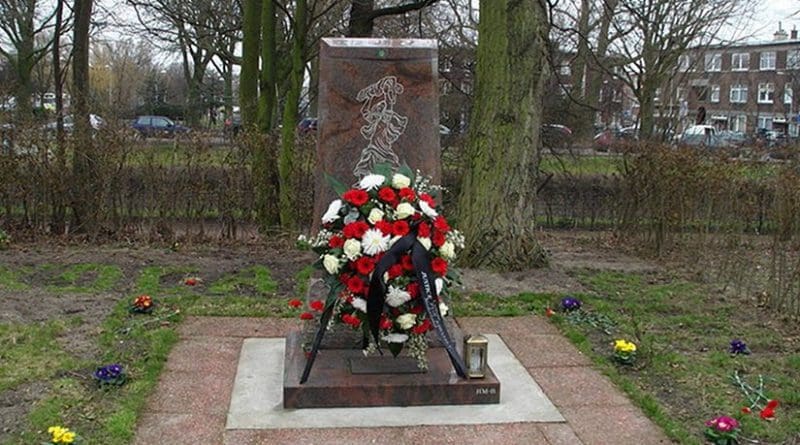IUS International Conference Commemorates 26th Anniversary Of Khojaly Genocide – Oped
By Peter Tase
On February 22, 2018, in the International University of Sarajevo (IUS), Bosnia and Herzegovina, was held an international conference to commemorate the 26th anniversary of the Khojaly Genocide. Furthermore, on this occasion was promoted a unique book translated into Bosnian language, entitled: The children that did not grow up, written by Mr. Elshad Eyvazli, a distinguished European author. This conference was organized thanks to the strategic cooperation between IUS and the Embassy of the Republic of Azerbaijan in Bosnia and Herzegovina.
This international conference was attended by academicians, prominent international law experts, public figures, members of the parliaments of Bosnia and Herzegovina and Azerbaijan, as well as by representatives of NGOs, members of diplomatic corps and the mass media from Bosnia and Herzegovina, Montenegro, Serbia, and Azerbaijan.
Some of the keynote speakers of this conference were: the Ambassador of the Republic of Azerbaijan to Bosnia and Herzegovina Prof. Dr. Eldar Hasanov; Chancellor of IUS, Prof. Dr. Tahsin Erkan Ture; the author of the book Elshad Eyvazli; Member of the National Assembly of the Republic of Azerbaijan, Head of the working group on inter-parliamentary relations between Azerbaijan and Bosnia and Herzegovina Mr. Chingiz Ganizade; Member of the Writers’ Association of BiH, Serbia and Montenegro; Member of Circle 99, Assoc. Prof. Dr. & Dr. Honoris Causa Sabahudin Hadžialić; Professor of the Sarajevo University, Doctor of Law Edin Halapić; and eyewitnesses of the Khojaly Massacre Sabina Maharramova and Murad Huseynov.
The panelists spoke about the surprise attack committed by the armed forces of Armenia on the city of Khojaly in the Nagorno Karabakh region of Azerbaijan in the night from February 25 – February 26 in 1992, as well as the cruel and merciless killing, severe wounding, taking hostages, torturing and disappearance of the civilian population in the city of Khojaly.
The keynote speakers underlined also the following points: the crimes perpetrated in Khojaly were part of the systematic violence policy of Armenia against Azerbaijani civilians; this policy is founded on the nzhdeizm ideology that inculcates racial superiority of Armenians and hatred against Azerbaijanis; the events in Khojaly must be classified as a crime of genocide; and Armenia and its political-military leadership bear responsibility for this crime according to the international law and pertinent resolutions of the United Nations.
During his presentation in the IUS International Conference on the commemoration of the 26th anniversary of Khojaly Genocide; Assoc. Prof. Dr. & Dr. Honoris Causa Sabahudin Hadžialić stated: “At one point I did not ask myself if I should be one of the promoters of this sorrowful saga about the suffering of children who did not grow up in Azerbaijan, because the children of this region did not grow up precisely because of the suffering and cruelty to which they were exposed in the wars of the 1990s on the territory of former Yugoslavia, especially in the area of our homeland, Bosnia and Herzegovina, a cruelty that was equal to the one experienced by our Azerbaijani brothers and sisters. Today, I am here with you, because it is the duty of every man whos existence does not rely on the exclusiveness towards the other but relies only and only on the directness of the ultimate understanding that we all have a red color of our blood under our skin and precisely that color of blood does not make a difference between, but the people itself.”
Assoc. Prof. Dr. and Dr. Honoris Causa Sabahudin Hadžialić continued with his speech: “The terrible suffering of the Azerbaijani people, as only a portion of the suffering of children and their families, including the people of Azerbaijan is shared in this book, by author Elshad EYVAZLI, is merely a continuation of suffering that encompasses human civilization since its appearance, from the Holocaust orchestrated during World War II, the genocide in Srebrenica, to the present day and – how to name the tragedy were hundreds and hundreds of innocent victims in Khojaly lost their lives, at the end of the last century? A killing, massacre, or ethnic cleansing, having in mind that Quran’s verse says: “Whoever kills an innocent man is as if he killed the whole world! Whoever saves a man, is as if he has saved the whole world! “Where was our civilization when the world was murdered not once but thousands of times in Srebrenica and other strata of peoples in Bosnia and Herzegovina? Where was the civilization when the world was murdered not once but hundreds of times in the Khojaly Massacre in Azerbaijan?”
In regards to the book, Assoc. Prof. Dr. Hadžialić states: “Indeed, I have been sincerely touched by the lines of this little – great people, children who never grew up. I’m not going to talk about the individual pain and suffering mentioned in this book because every pain is special to itself and that’s why you really have to read through it, not just reading it, because this book is an unfinished, continuous story of suffering. Every new reading creates a new pain, a pain that survives in the eternity of civilization as a continuum.”

